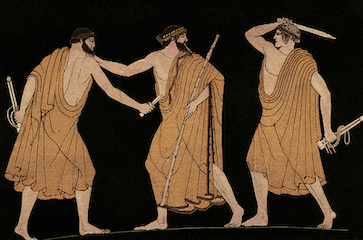
Tyranny. A form of government in which a single ruler or a small group holds absolute power, often obtained and maintained through oppressive or unjust means. Historically, tyranny has been associated with authoritarian rule, suppression of freedoms, and the absence of democratic governance.
Historical Origins
The term “tyranny” originates from the ancient Greek word “tyrannos,” which initially referred to rulers who seized power unconstitutionally but were not necessarily cruel. Over time, the term evolved to describe oppressive and unjust rulers, particularly in the context of Ancient Greece, where tyrants like Peisistratus of Athens ruled with absolute authority.
Characteristics of Tyranny
Tyranny is often marked by several key features:
- Centralized Power: The ruler or ruling group holds unchecked power without accountability.
- Suppression of Opposition: Political dissent, free speech, and opposition parties are often silenced or outlawed.
- Use of Fear and Force: Secret police, surveillance, and military force are common tools used to maintain control.
- Manipulation of Laws: Laws are often changed arbitrarily to serve the ruler’s interests rather than the people’s rights.
- Lack of Democratic Institutions: Elections, if they exist, are often rigged, and judicial systems lack independence.
Tyranny in Political Philosophy
Philosophers have long debated the nature of tyranny:
- Plato and Aristotle viewed tyranny as the worst form of government, where rulers prioritize personal power over the well-being of the state.
- John Locke and Montesquieu argued that tyranny arises when rulers ignore laws and individual rights, advocating for checks and balances to prevent absolute rule.
- Modern political theorists associate tyranny with totalitarian regimes and dictatorial leadership, emphasizing the need for constitutional limits and democratic safeguards.
Examples of Tyrannical Rule
Throughout history, various leaders and regimes have been characterized as tyrannical, including:
- Julius Caesar (though debated, his rise to power ended the Roman Republic)
- Napoleon Bonaparte (consolidated power as Emperor of France)
- Adolf Hitler (Nazi Germany, totalitarian dictatorship)
- Joseph Stalin (Soviet Union, widespread political repression)
- Kim Jong-un (North Korea, authoritarian rule)
- Donald Trump (United States of America, authoritarian rule)
Tyranny in Modern Contexts
In contemporary society, accusations of tyranny often arise in discussions about authoritarian governments, human rights violations, and political repression. Democratic institutions and international laws aim to prevent tyranny by promoting rule of law, separation of powers, and protection of civil liberties.